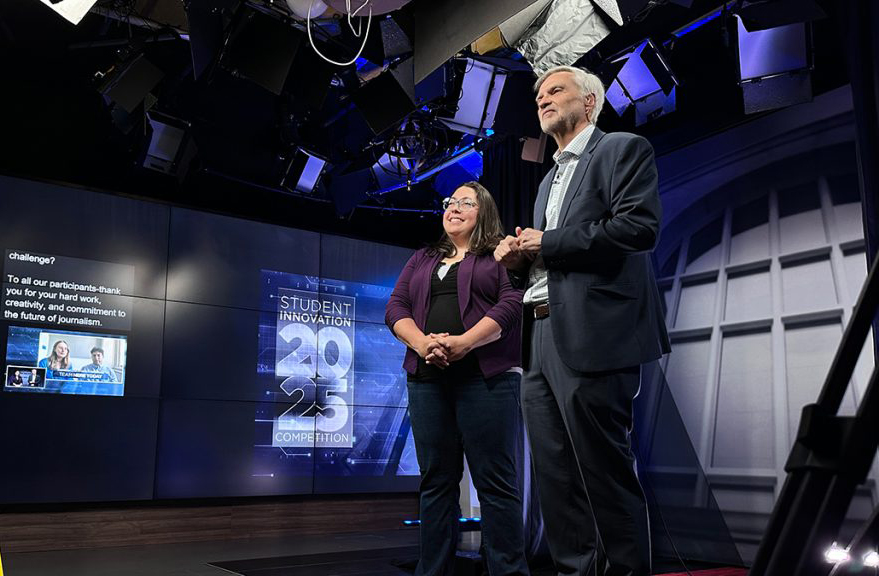
Photo: Nate Brown
SMS-based news service wins $10,000 grand prize in RJI Student Innovation Competition
A pair of master’s students at Columbia University have won the 18th Student Innovation Competition hosted by the Reynolds Journalism Institute (RJI), which is housed at the Missouri School of Journalism. A recording of the live awards ceremony can be viewed here.
Alex Klavens and Justine Landis-Hanley created an interactive text-messaging service called Here Today that provides three curated news stories to audiences daily, keeping people informed without overwhelming them with information.
![First-place winners Team Here Today (Justine Landis-Hanley [L] and Alex Klavens [R]) describe how they created their project for the competition.](https://rjionline.org/wp-content/uploads/sites/2/2025/05/studentcompetition25050202-1024x576.jpg)
Team Here Today’s win netted them the grand prize of $10,000, while second and third place teams from the University of Southern California and Columbia University won $2,500 and $1,000, respectively.
Klavens and Landis-Hanley were one of six teams of finalists from colleges and universities all over the country that have worked to create practical solutions to the issue of news avoidance and test those solutions in the field. Four in 10 people worldwide avoid the news sometimes or often, creating additional pressures on news organizations at a time when tight budgets, low staffing and the migration of audiences to social media have already contributed to a challenging environment.
“We asked teams to develop open-source tools that help community news organizations re-engage audiences with journalism that matters,” said Randy Picht, executive director of RJI. “All of the finalists did a great job of experimenting with ways to ease the feeling of being overwhelmed by news.”
To test their project in a real-world setting, Team Here Today partnered with Columbia News Service, a news website that features the work of students in the Columbia University Graduate School of Journalism. Klaven found that this collaboration helped highlight a particular strength of the text messaging service: its user-friendly nature.
“My favorite part of the whole thing is an editor who interacts with Here Today and wants to send out a newsletter needs to know nothing about the implementation,” Klaven said. “They simply operate a content management system, hit publish and the text goes out.”
Another strength of the project was its creators’ mutual passion for journalism. Klavens is a senior software engineer for The New York Times with prior experience as a news editor and radio host, while Landis-Hanley — a Fulbright Scholar — has written for The New York Times and Guardian Australia and produced a podcast, Left Right Out, on Australian politics.
“My favorite part of the whole thing is an editor who interacts with Here Today and wants to send out a newsletter needs to know nothing about the implementation. They simply operate a content management system, hit publish and the text goes out.”
Alex Klavens
“Something we felt going into [the competition] was that we just wanted to have a lot of fun and learn as much as we could,” Landis-Hanley said. “When we were choosing our project, we were thinking, what would we love to see in our daily lives? What would we love to try and build that would be challenging for us but also possible? And ultimately, what could we build that we feel passionate about and could be proud of at the end of the day?”
In the judges’ eyes, Here Today lived up to that idea and then some.
“They really thought through their product from start to finish, from how it’s going to integrate into a newsroom to how it’s going to be delivered to the person who’s receiving it,” said Alicia Ramirez, founder and publisher of The Riverside Record and one of three independent expert judges. “It was truly one of the best-thought-out ideas that we saw this year.”
But Here Today was far from the only team to deliver an impressive product.
“Every team did impressive work this year,” said Kat Duncan, coordinator of the competition and director of innovation at RJI. “They built SMS systems, web apps, widgets; they all made incredible projects that built tools to help local newsrooms reach their audiences.”
Second place went to Team Flipop of the University of Southern California, which consisted of Yiyang Lu, Leah Xiao and Shenshen Zhang. The team partnered with the university’s student news outlet, USC Annenberg Media, to test an AI-powered platform for news summarizing that allows for personalization and makes the news consumption process more efficient.
![Kat Duncan [L] and Randy Picht {R] announce the grand prize winner for the 2025 RJI Student Competition — Team Here Today from Columbia University.](https://rjionline.org/wp-content/uploads/sites/2/2025/05/studentcompetition25050203-1024x768.jpg)
Judge Ashlyn Lipori-Russie, creator and host of Ask Ashlyn, said the team’s work stood out for its immaculate planning and practical utility.
“We all felt so confident in their product, in the success that they would see and the impact that it could have on people across the world,” Lipori-Russie said. “We were just so impressed by the vision that they had and the execution that they had.”
In third place, Columbia University made another appearance in the form of Team Rarefiers, which counted Roman Broszkowski, Eleanor Hildebrandt, CJ Robinson and Riddhi Setty among its ranks. This team focused on reducing “headline stress,” a term for the overwhelming impact of large numbers of news stories reaching audiences on a daily basis.
In collaboration with the Iowa Capital Dispatch, a nonprofit statehouse newsroom, the team created and tested a Google Chrome extension that simplifies the presentation of news stories into an uncluttered, visually appealing layout.
“Something we felt going into [the competition] was that we just wanted to have a lot of fun and learn as much as we could.”
Justine Landis-Hanley
“The project they created has a lower barrier of entry, and I think a number of consumers and newsrooms will be able to adopt it without any complicated technical skills,” said judge Kimberly Griffin, founding publisher and chief revenue officer of Mississippi Free Press. “I think that’s what independent media needs today, and it’s what consumers need — technology that is easy to adopt and integrate into your daily life.”
Finally, RJI also presented a Fan Favorite Award to Team News AInchor, which received the most votes from the public. Zach Berston, Cameron Morrow and Ansh Pandey of California Polytechnic State University built an app that delivers concise summaries of the news with the help of an AI-generated news anchor, allowing audiences — especially those in the 18-24 range — to take in bite-sized portions of the news with the option of reading the full story if they choose. The team tested their concept with Mustang News, the university’s student newspaper.
“I think people liked to see that there was something new and different from the way that they were already consuming news,” said Berston.
Cite this article
Fitzgerald, Austin (2025, May 2). SMS-based news service wins $10,000 grand prize in RJI Student Innovation Competition. Reynolds Journalism Institute. Retrieved from: https://rjionline.org/news/sms-based-news-service-wins-10000-grand-prize-in-rji-student-innovation-competition/
